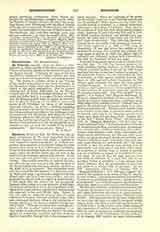

Ex Cathedra, literally “from the chair”, a theological term which signifies authoritative teaching and is more particularly applied to the definitions given by the Roman pontiff. Originally the name of the seat occupied by a professor or a bishop, cathedra was used later on to denote the magisterium, or teaching authority. The phrase ex cathedra occurs in the writings of the medieval theologians, and more frequently in the discussions which arose after the Reformation in regard to the papal prerogatives. But its present meaning was formally determined by the Vatican Council, Sess. IV, Const. de Ecclesia Christi, c. iv: “We teach and define that it is a dogma Divinely revealed that the Roman pontiff when he speaks ex cathedra, that is when in discharge of the office of pastor and doctor of all Christians, by virtue of his supreme Apostolic authority, he defines a doctrine regarding faith or morals to be held by the universal Church, by the Divine assistance promised to him in Blessed Peter, is possessed of that infallibility with which the Divine Redeemer willed that His Church should be endowed in defining doctrine regarding faith or morals, and that therefore such definitions of the Roman pontiff are of themselves and not from the consent of the Church irreformable.” (See Infallibility; Pope.)
E. A. PACE

